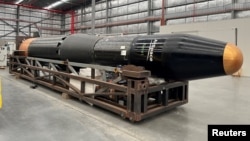A Taiwanese business is seeking to become the first foreign company to launch a rocket from Japan.
The planned launch comes as Japan keeps on a path to invest $26 billion in its space agency over the next 10 years. The idea is to create a space hub for other nations in Asia.
The private Taiwanese company is called TiSpace. It was started in 2016 by current and former officials from the country’s space agency. It has not yet completed a successful rocket launch.
TiSpace’s most recent launch attempt came in 2022. The effort was in cooperation with Australian company AtSpace. The launch attempt failed because of a fuel-related issue. The rocket to be launched in Japan is a different design.
There has been some opposition in Japan to the country’s plans to contract with foreign businesses for space activities. But TiSpace chairman Yen-sen Chen told Reuters he thinks the planned launch should make “a very good case” for Japan’s government.
Chen said his company was waiting on one last government approval before the rocket launch can be set. The launch will involve a sounding rocket that could happen by early 2025. A sounding rocket can fly to space but does not reach orbit.
Some industry experts have suggested that China could oppose the launching of a Taiwanese rocket from Japan. China claims Taiwan as its own territory. But Chen said he had not yet heard any concerns from China.
A representative from China’s foreign ministry told Reuters it did not have detailed information about the planned rocket launch.
In Japan, the government’s Cabinet Office said “free economic and research activities are guaranteed in Japan” within the structure of the country’s existing laws and regulations.
TiSpace is the only Taiwanese company seeking rocket launches in Japan. One of the company’s other co-founders, Wu Jong-shinn, is currently head of Taiwan’s space agency. Agency officials had no comment on TiSpace’s plans and said all its launch services are carried out through government contracts.
The company’s launch plans have won support among some Japanese space businesses, especially in the rural town of Taiki. That is where TiSpace’s launch will take place.
Space officials and industry experts say it is a good thing that Japan is inviting foreign companies to use its space services.
Yuko Nakagawa is a ruling-party lawmaker who represents Taiki and neighboring communities. She said she sees the TiSpace project as "a symbol of Taiwan-Japan friendship." She noted that the addition of more international businesses to the area can help create a large space complex to serve a number of nations.
Japanese officials have said they want the country’s private space industry to be worth more than $50 billion by the early 2030s. The space program could include up to 30 rocket launches a year.
Reuters reported that Japan is negotiating a space technology agreement with the United States that could open the door for private American rocket launches in Japan.
I’m Bryan Lynn.
Reuters reported this story. Bryan Lynn adapted the report for VOA Learning English.
_________________________________________
Words in This Story
hub - n. a place that is the center of a particular activity
regulation – n. an official rule meant to control an activity or process
symbol – n. a sign or object that is used to represent something






Forum